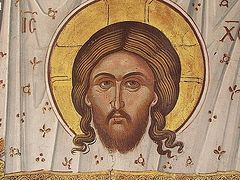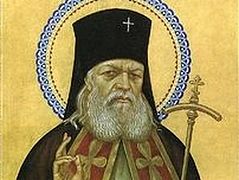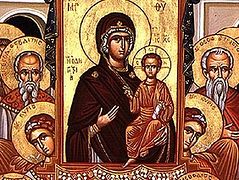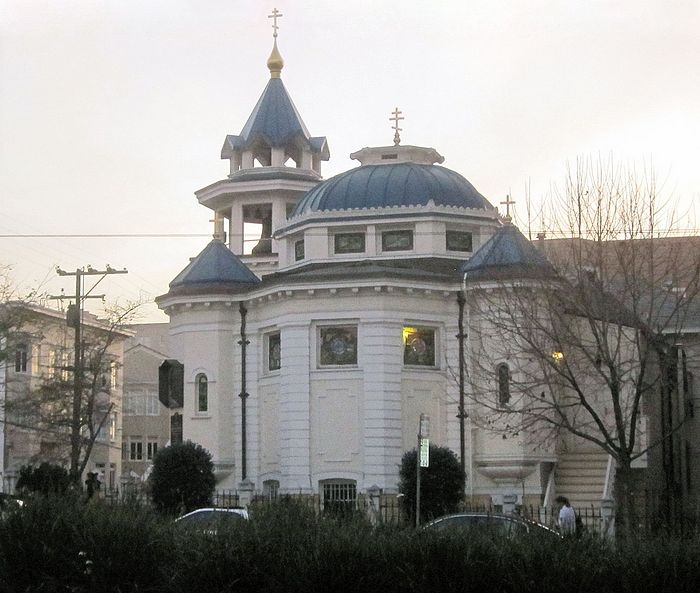 The Holy Trinity Orthodox Cathedral, San Francisco, California
The Holy Trinity Orthodox Cathedral, San Francisco, California
In the Name of the Father, and of the Son, and of the Holy Spirit.
My dear brothers and sisters in Christ: We gather this evening to celebrate the Sunday of Orthodoxy and to pray together at this peaceful yet glorious Vespers service sung so beautifully by the Cathedral choir and those who have joined them. Especially in North America, this day has become a day for Orthodox Christians to come together with thanksgiving to Almighty God in order to celebrate our unity and our common joy at the restoration of the holy icons. I am grateful to His Eminence, Archbishop Benjamin for his great kindness in inviting me to be with you this evening, and for our concelebration this morning, together with His Grace, Bishop Daniel at the Divine Liturgy at St Seraphim Cathedral in Santa Rosa.
It is also a great joy to welcome His Eminence, Archbishop Kirill of the Russian Orthodox Church Outside of Russia, with whom I recently had the honor of serving with—along with several hundred other hierarchs—in Moscow for the celebrations of the tenth anniversary of enthronement of His Holiness, Patriarch Kirill. Your Eminence, we are grateful for the brotherly relations that exist between the Orthodox Church in America and the Russian Orthodox Church Outside of Russia, and in particular for the strong fraternal relations that exist particularly here in the Diocese of the West.
We are blessed to hold this evening’s service here at the historic Holy Trinity Cathedral, which just recently celebrated its 150th anniversary. I was here for those celebrations last October and offer my thanks to Archpriest Kirill Sokolov and the Cathedral Community for their hospitality once again.
When he arrived in North America in 1898, my namesake, St Tikhon, the Enlightener of North America, came to San Francisco, and offered the following words in this very cathedral, recalling the words of the prophet Hosea:
“By the will of God, I, too, in my unworthiness, was called to apostolic service here, and so now I too will say to those called ‘not my people,’ ‘You are my people;’ I will call ‘beloved’ the one called ‘not my loved one.’ Until now, we had been strangers to each other, and did not know each other. Henceforth, the Lord Himself is placing us into a bond of closeness, into a mutual relationship of bishop with his flock and flock with her bishop.”
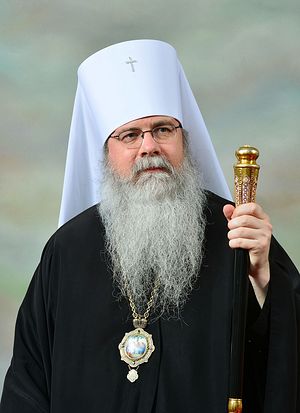 Metropolitan Tikhon (Mollard). Photo: oca.org It is those same bonds of closeness that we experience today in our Churches, especially as we celebrate the eternal truths of Holy Orthodoxy as conveyed particularly through the icons. The Synodikon of Orthodoxy speaks of “islands dedicated to God,” quoting from another prophet, the prophet Isaiah (41.1), and clarifies that these islands refer to “the Churches from the nations and, by Churches, not splendid Church buildings, but the fullness of those who perform acts of reverence in them and worship the Divine with hymns and praises.”
Metropolitan Tikhon (Mollard). Photo: oca.org It is those same bonds of closeness that we experience today in our Churches, especially as we celebrate the eternal truths of Holy Orthodoxy as conveyed particularly through the icons. The Synodikon of Orthodoxy speaks of “islands dedicated to God,” quoting from another prophet, the prophet Isaiah (41.1), and clarifies that these islands refer to “the Churches from the nations and, by Churches, not splendid Church buildings, but the fullness of those who perform acts of reverence in them and worship the Divine with hymns and praises.”
For many years the Orthodox Church in America has held firm the faith of the Apostles, the faith of the Fathers, the faith of the Orthodox, the faith that makes fast the inhabited world. In our Churches, Chapels, monasteries, seminaries, and institutions throughout the United States, Canada, and Mexico, places where “Churches from the nations” are also now found, our communities give glory, honor, and worship to the one God and Father, to our Holy Lord Jesus Christ, and to the Holy Spirit. Our bishops oversee our Church life, ministering to the flock entrusted to us by the grace of God, with all canonical strictness and in fidelity to the tradition of the Church. At every level of our ecclesial experience, we seek to resolve our internal problems conciliarly with the fullness of our Church according to the tradition we have received. Our Church, sojourning here in North America, gives thanks to God for the great blessings he has given us, and also to the communion he has allowed us to maintain in our common faith with the other local Orthodox Churches.
All of this brings us back to our common missionary calling, which St Tikhon also spoke of in 1898. Contrasting the aggressive ways of non-Orthodox missionaries, he points out that “Orthodox missionaries, on the other hand, act differently: they go to their holy task not in order that through it they might obtain glory among men, but in order they themselves might reap mercy from God as well as salvation for others. They do not trumpet their success before the whole world, and, indeed, do not ascribe success to themselves but to the power of God.” In another place he would add: “But most importantly, the Orthodox Church accomplishes her [missionary] task in silence, with humility and godliness, with an understanding of human frailty and divine power.”
What we accomplish this evening is an example of what St Tikhon spoke of. Regardless of the divisions and conflicts that take place in the world around us, it is through our humble worship and fervent prayer that we make the light of Orthodoxy shine on the darkness around us. Today’s commemoration, the restoration of the veneration of the holy icons, is truly a Resurrectional feast, a Paschal celebration and a source of encouragement for us in our Lenten struggles. It is in this way that we share the glory of Orthodoxy that is revealed in our theology, our hymnography, and our iconography. And we do so here in North America, as it done throughout the Orthodox world.
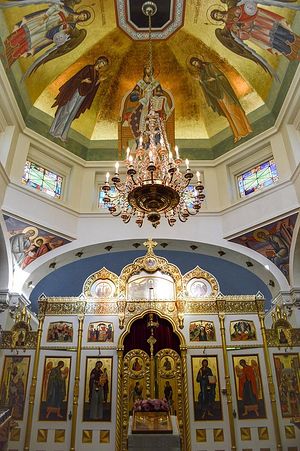 The Holy Trinity Orthodox Cathedral, San Francisco, California
The Holy Trinity Orthodox Cathedral, San Francisco, California
In the same year that he preached in San Francisco, St Tikhon also spoke in New York thanking everyone for their kindness in welcoming him and saying that his sincere and most heartfelt prayer at this moment was the petition in the Lord’s Prayer, “Thy Kingdom come!” He went on:
What better missionary goal is there than this? And God has already shown his great mercy to America in no small measure. The Kingdom of God has already arrived here: the building of Orthodox work has already begun and is gradually strengthening and expanding. A good feeling is taking root among the widely dispersed members of the church here. And the surroundings to which divine Providence has brought us to carry out our life and work are not hostile to our high goal.
Although our challenges today might be externally different, Saint Tikhon’s words about both the difficulties and the opportunities facing the Church are an encouragement to us today. As we celebrate the Sunday of Orthodoxy, and reflect upon the blessings and struggles of the past, let us be inspired by the true icons of the Kingdom, such as St Tikhon, who reminds us to be grateful to our merciful God for the gift of one another and for the freedom to witness to the Orthodox Faith, which has been proclaimed in North America for more than two hundred years. By God’s grace, all of these accomplishments have been achieved through the various Orthodox Churches in North America and by the dedication and initiative of Orthodox Christian men and women of vision. We should be grateful for what has been accomplished and also be mindful of the task still before us, with all its challenges and obstacles.
Christianity is about movement and vision (“come and see” as we heard in today’s Gospel), movement and vision that are not limited to the physical realm or in the confines of the mind, but rather take our hearts, which have been overshadowed by the grace of the Holy Spirit, on the journey that introduces us into the heavenly kingdom. We make this journey in the place that we have been planted and in the community we are a part of, but our goal should be to persevere and support one another on our common journey towards the heavenly kingdom, of the Father and of the Son and of the Holy Spirit. Amen.

